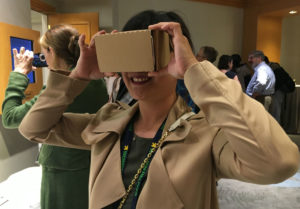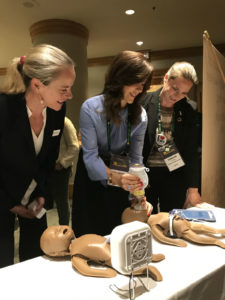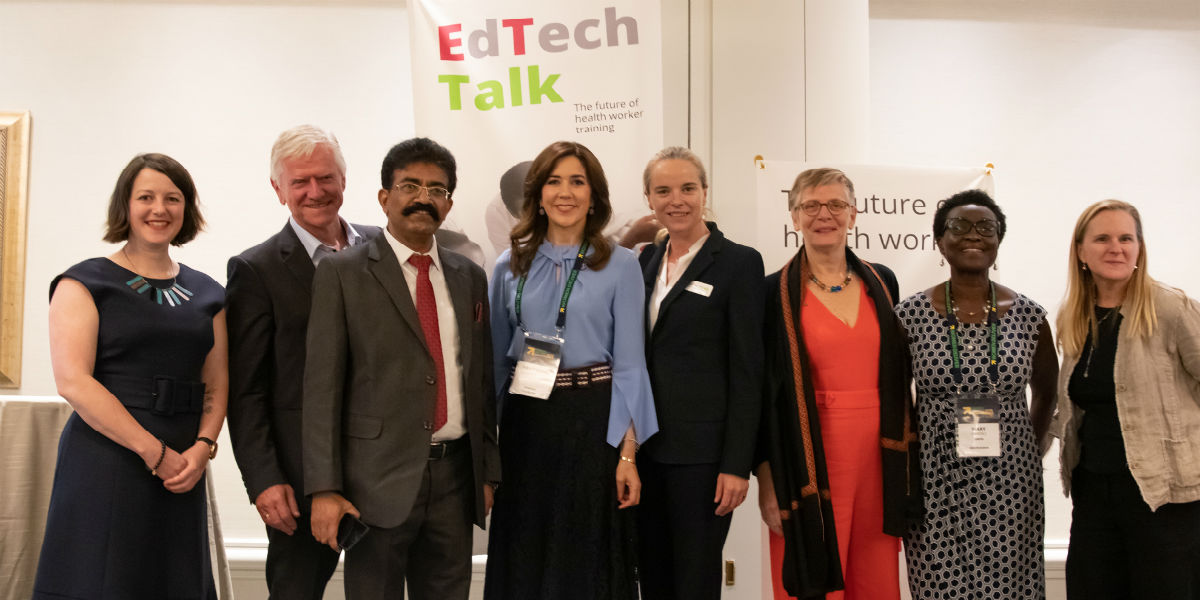EdTech Talk at Women Deliver 2019: Can technology save lives in childbirth?
How can technology empower midwives to save more women and newborns in childbirth?
That was the overarching theme of the first-of-its-kind EdTech Talk organized by Laerdal Global Health, International Confederation of Midwives and Maternity Foundation during the 2019 Women Deliver Conference in Vancouver on June 4th.
Every day, more than 800 women and 7000 newborns die of causes related to pregnancy and childbirth, and research shows that 80% of maternal deaths can be averted through access to quality midwifery care. Hence, building the skills and knowledge of health workers is a crucial step to improve maternal and newborn health and reach the Sustainable Development Goal #3 focusing on healthy lives and wellbeing for all.
Why EdTech?
New technological innovations offer unprecedented possibilities for reaching health workers across low- and middle-income countries with quality educational technology, widely known as EdTech. To discuss and shed light on the opportunities and realities on the ground for using EdTech as a training and learning tool for midwives, Maternity Foundation partnered up with Laerdal Global Health and International Confederation of Midwives to present EdTech Talks during the Women Deliver Conference in Vancouver, where more than 8000 delegates from all over the world came together to discuss women’s health, rights and wellbeing – with a large and cross-cutting emphasis on sexual and reproductive health and rights including maternal and newborn health.
Through a series of seven dynamic talks and interviews with leaders within health innovation EdTech and midwifery – and competently moderated by the co-CEO of Grand Challenges Canada, Dr. Karlee Silver – the event offered the around 150 attendees dynamic, inspirational and educational inputs on how technological innovations can empower midwives to save more lives in childbirth.
Below are some of the highlights from the EdTech Talk speakers.
International Confederation of Midwives
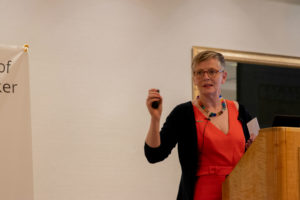
Franka Cadée, President of International Confederation of Midwives, kicked off the talks by bringing focus on how tech needs to work for the midwives in their daily work:
“Midwives are eager to receive training. We must be careful to make sure the technology is there for the midwives themselves. Technology is wonderful, but technology without humility is nothing. Tech can help midwives in their training, and it can also help reclaim midwives’ time so that they can focus on the birthing woman and make sure that it is a transformative experience.”
Maternity Foundation
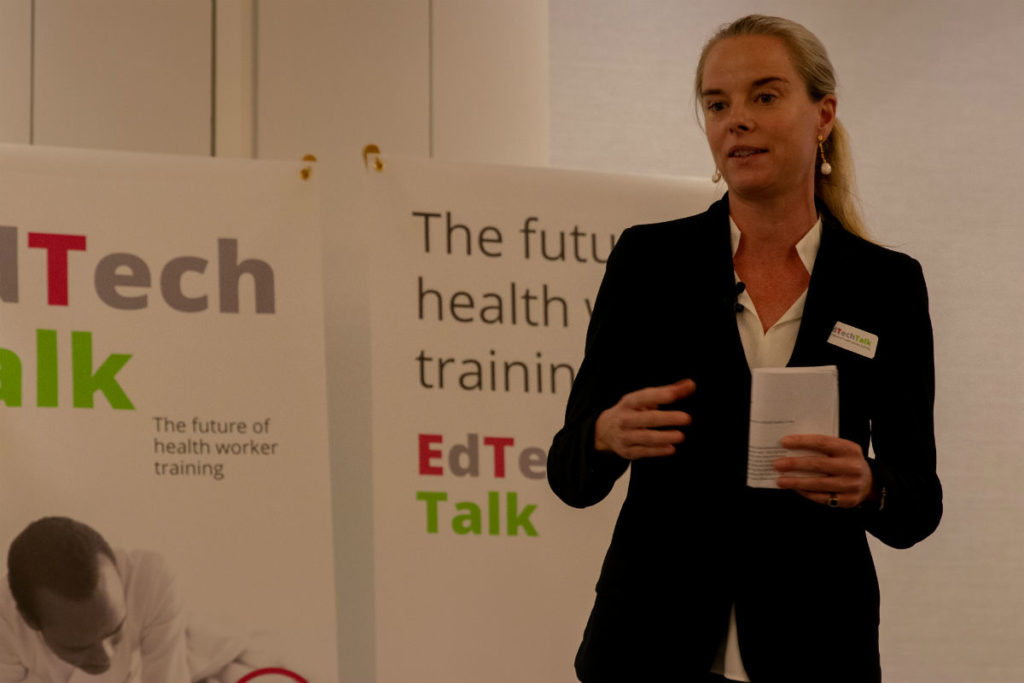
Anna Frellsen, CEO of Maternity Foundation, talked of key learnings when rolling out the Safe Delivery App as a training tool for midwives in low- and middle income countries:
“Originally, we developed The Safe Delivery App as a stand-alone job aid supporting midwives in their everyday work, but we have increasingly started working with partners on integrating it with training and mentorship programs. In general, we see a shift in trainings; from longer, lecture-based classroom trainings towards shorter, more hands-on interventions at the facilities and in skills labs. Blended learning is when we combine in-person training with digital components and use it in training, group exercises, classroom lectures, skills practices and drills. So, to answer my own question: Can an app save lives in childbirth? No, it cannot. Strong midwives can – and an App can help them.”
Ministry of Health & Family Welfare, Government of India
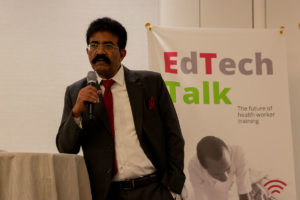
Dr. Dinesh Baswal, Deputy Commissioner, Maternal Health Division, Ministry of Health and Family Welfare, Government of India, shared experiences of using technology to improve maternal and newborn health in India:
”There is a lot of hope with these latest technologies. We have a problem with capacity building, we have a huge health worker workforce needing capacity building in a huge and diverse country. Technology can really make a difference. There is a huge opportunity with tech if you think outside of the box. It can revolutionize our teaching and learning processes.”
Laerdal Global Health
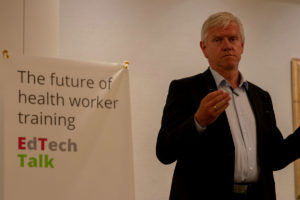
Tore Laerdal, Executive Chairman of Laerdal Global Health, addressed the main challenges of educating more health workers while ensuring high quality of care:
“The call to action that the World Health Organization has presented to us is addressing the 18 million health worker shortage by 2030. Is it a matter of doing more of the same? Today, more lives are lost due to health care delivered that is poor quality than health care that is not delivered. We need a major paradigm shift in the way we are educating. How can we capitalize on the digital revolution and use it in training, clinical practice, live feedback & decision support? It’s not only a matter of education, it’s much more – for instance issues related to pay and respect for the midwives.”
United Nations Population Fund, UNFPA
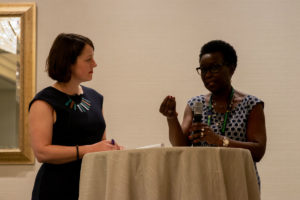
Mary Otieno, Country Representative of UNFPA in South Sudan, (pictured with co-CEO of Grand Challenges Canada, Karlee Silver, who moderated the event) shared realities on the ground for midwives in the world’s youngest country:
“In 2011, South Sudan had 8 midwives. Today, we have over 700. One of the areas that is mainly lacking now is formal in-service training. This is somewhere EdTech can help. Ideally, it has to be offline, portable, and use solar power because there is often no power source in the facilities, internet is expensive, and smart phone ownership is very low. Technology is good but it has to fit the context it is meant to work within. Innovation does not have to be a technology, but can also be the process of innovating and doing something differently.”
Microsoft
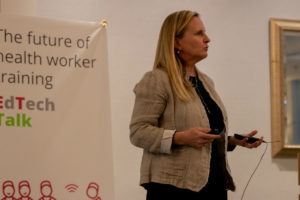
Director of Worldwide Education Research at Microsoft, Maria Langworthy, gave her view on how existing technology can support and improve learning:
“At Microsoft, we are very committed to helping the world develop skills for modern life: technical skills, human empathy skills, etc. Part of that is learning models for teaching and how they’ve changed over time. It is about leveraging technology that already exists, so the money that you spend can be directly optimized by the last mile. This way we’re all leveraging each other’s resources. That’s how the approach to modern learning will help development skills and impact lives.“
HRH Crown Princess Mary of Denmark
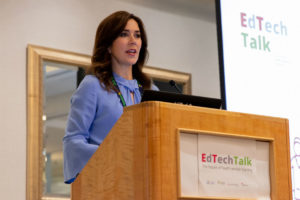
In her concluding remarks, Her Royal Highness Crown Princess Mary of Denmark pledged to think in new and innovative ways to save more women and children in childbirth:
“As patron of both UNFPA and Maternity Foundation – and as a mother- I know how important it is to have quality care around you during pregnancy and childbirth. However, I’m painfully aware of the contrasting reality on the ground in many places in the world. As we have learned today, technology allows for new ways of learning and for reaching the otherwise hard-to-reach with quality educational content. More of the same will no longer cut it.”
Solutions Bar
The EdTech Talks were followed by a Solutions Bar, where participants had the chance to see and try a range of different EdTech innovations – from virtual reality glasses to training apps and simulations dolls – presented by Microsoft, GynZone, Mobile Helping Babies Survive and eHelping Babies Breath, Maternity Foundation, and Laerdal Global Health.
